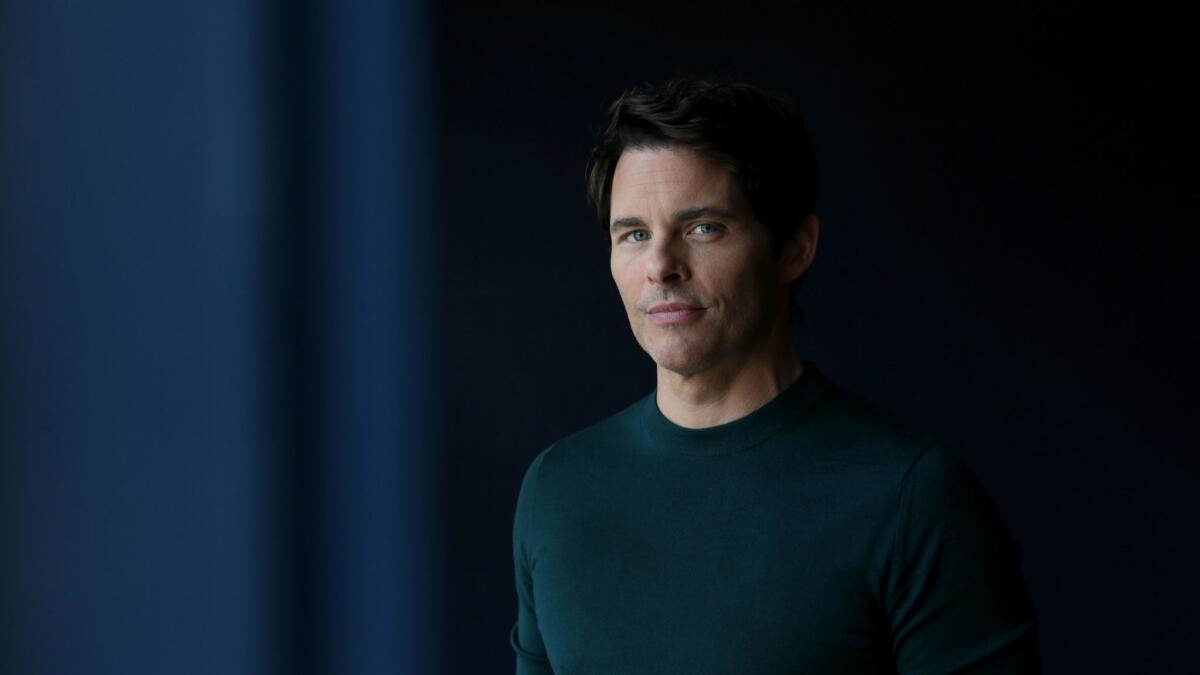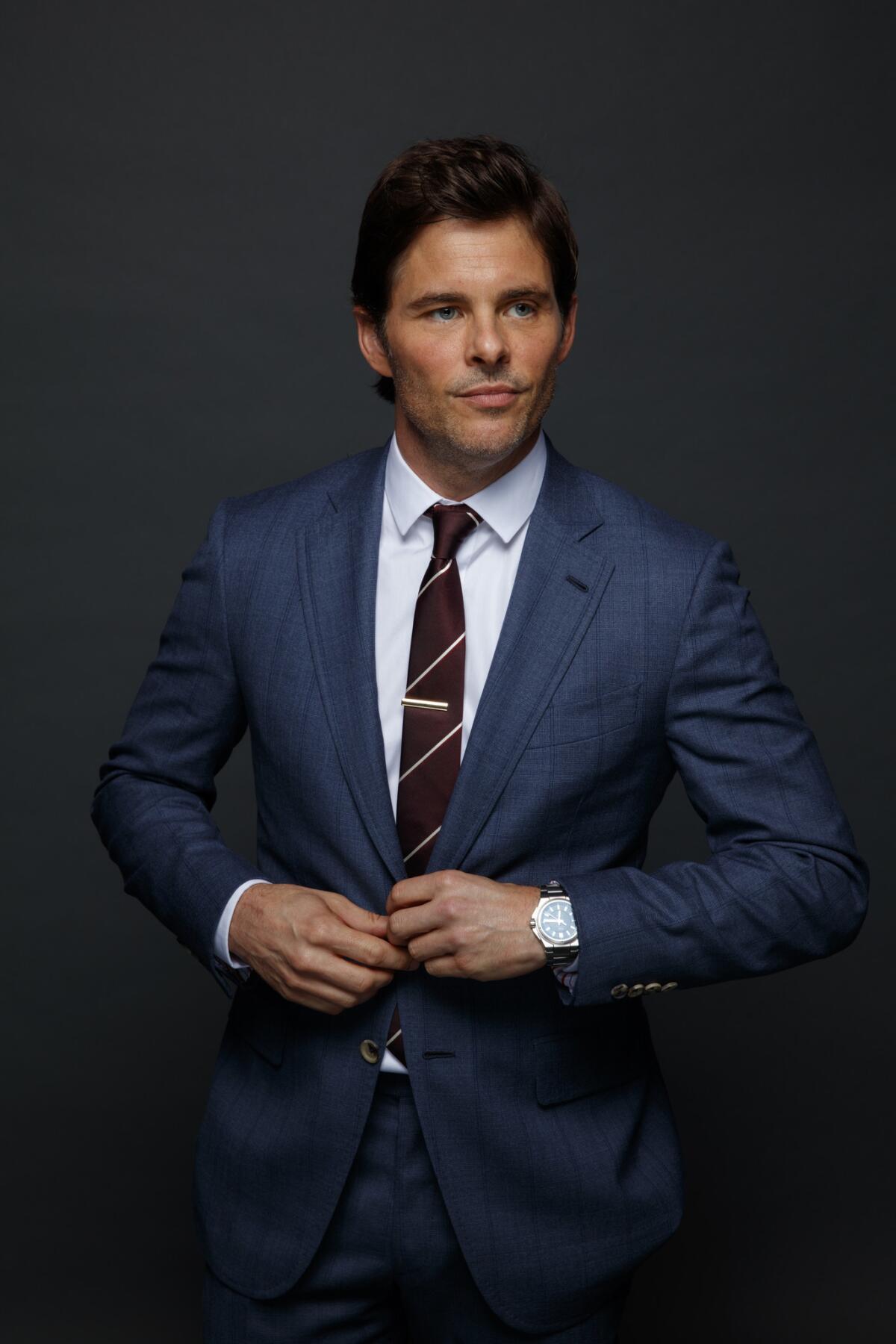‘Dead to Me’s’ James Marsden has some things to say about being the bad-guy lover

James Marsden knows a thing or two about being pegged as the bad-guy love interest. Hello, this is the guy who has spent the better part of the last 15 years being considered the “villain” in the modern-day romantic classic “The Notebook” with his portrayal as Lon, the non-Ryan Gosling war veteran and interim love interest to Rachel McAdam’s Allie. It’s a reputation he still challenges.
“There was nothing wrong with Lon in ‘The Notebook,’” Marsden says matter-of-factly, with a layer of playfulness. “But for some reason, he’s the bad guy. And it’s like, wait, [he’s] letting her actually go figure her stuff out. He’s understanding! But some people think he’s the bad guy.” With his role in “Dead to Me,” Marsden at least understands the animus. (Warning: spoilers ahead.)
The buzzed-about Netflix traumedy, released earlier this month, stars Christina Applegate and Linda Cardellini in a story centered on the unlikely — and darkly twisted — friendship between two women. Judy (Cardellini) befriends Jen (Applegate) at a grief counseling group not long after the hit-and-run death of Jen’s husband, Ted. Viewers soon learn that Judy was driving the car that killed Ted. And she’s been covering it up at the urging of her smarmy, narcissistic, money-laundering ex-fiance Steve (Marsden), who was in the car with her when it happened.
Marsden, who will also be seen later this summer in Quentin Tarantino’s tardy Cannes entry “Once Upon a Time in Hollywood,” and this fall in “Sonic the Hedgehog,” spoke with The Times about playing a jerk, mastering the art of the trampoline and his thoughts on death.

You had quite the pivot — going from filming “Sonic the Hedgehog” to “Dead to Me.” What drew you to the role of Steve?
Yes, I’d just finished “Sonic” so I was exhausted. In that movie, it’s you and nothing. Like it’s Ben [Schwartz] creating the voice somewhere on a soundstage in L.A. and I’m with a green screen. So I was beat and they said there’s this really cool Netflix project with Linda Cardellini and Christina [Applegate]. I love them both, I’m friends with both of them. And was told Liz Feldman is writing and producing it and is the showrunner and here’s what it’s about and here’s the script to the first episode.
REVIEW: In ‘Dead to Me,’ bad dudes and a female friendship forged in fire »
I thought the tone of the show was fresh. It was a half-hour comedy but it was really heavy and dark, which is to me my favorite source of comedy. So it was all of those things. Working with some of my favorite people and doing something that felt original in a time where it’s tough to get original content anymore.
How much were you filled in on what Steve’s trajectory would be?
I had one script and I had a phone conversation with Liz where she’s like, “OK, he is kind of heavy and not a great guy … he’s got some issues in his life, got some problems and he likes to launder money and use his charm to get what he wants, and to create, what we realize later, was a nice giant house of cards. [He] manipulates the two women to pit them against each other to some degree.”
ALSO: Christina Applegate and Linda Cardellini on their dark friendship in Netflix’s ‘Dead to Me’ »
What was appealing to me about the character though, was that there was a sense of douchebaggery that was kind of fun to play.
It feels weird to say that you’re good at it.
Well, anytime I get an opportunity to make fun of somebody that I would maybe make fun of in real life — if I get to do that with a performance, it’s fun. You don’t get those opportunities to be that way — nor would you want to be that way, in real life — and also show complexities there too.
The guy has compartmentalized his whole life and he’s created a facade of a business and a facade of a personality, really. And there’s a little bit of psychosis in there. It’s always interesting to find the most despicable part about the character and try to mine humanity out of it. And more importantly, how do you even find comedy in it. It was a nice challenge to find the balance in there with that.
Was it any surprise that Steve starts the morning by jumping on a mini trampoline? It’s such a good detail.
That’s what is another thing that drew me to it — Liz makes these observations about human behavior. Like, the Coen brothers are my favorite. They always are really very good at highlighting and displaying really some odd and weird things about human behavior. And here’s this guy talking about, “I got to get on my tramp and get my blood flowing.” He’s got a … mini trampoline on his balcony that he jumps up and down on like a child.
I wanted to be in the room when Liz came up with that idea. Because I can see a studio executive, like, “Cut that out, what does that even mean? Like, why is he doing that?”
But it’s so perfect. The weirder and more bizarre behavior there is in a role, the more I’m drawn to it. Even if there’s no reason for it whatsoever. Like the first scene you see him in, he’s like, “I got to go, I’m running a bath. Like, my bath water’s running.” He’s a 45-year-old man and just completely unabashedly saying, “Yeah, I’m running a bath, I got to go.”
In “Westworld,” your character Teddy died over and over again. Was it a nice change of pace to only have to die once?
Yes! I knew [about the death] before we started shooting. [Liz] gave me the bullet points, highlights of the season so that I could connect the dots. And I knew that that was how it ended. I used to be the guy who doesn’t get the girl, and now I’m the guy who doesn’t live. But yes, it was great to only die once and permanently.
Given that you seem to have mastered the art of the death, how do you view it? Are you someone who fears it or is at peace with it?
Not because of work. But I think just innately, once you reach your mid-40s, you do start to go, “Oh, I used to be able to do that and I can’t do that now.” Or, “I do that now and it hurts. Oh, this is hard ... I’m slowly starting to degenerate.”
It is something that you think about more as your kids start to grow up. I used to be young, dumb, confident, naive and invincible. And then you get older and you become wiser and more accepting of the realities of our journey and I think those thoughts or contemplations are also part of the human condition. Can you talk about that and the certainty of that without being afraid of it or having fear? I think we spend most of our lives trying to put fear on the back burner.
How do we take this armor off and allow ourselves to realize that it is going to come to an end? And how do we do that with grace and wisdom and compassion and everything, all that stuff. Anyway, yeah, I can go on and on about that.
Something happened recently. I had vertigo last October. Never knew what the hell that was, even though it was a real thing. I got out of the shower and I fell over. And I had to crawl to the toilet to throw up. It sounded like a severe hangover but you’re like, “I have no alcohol in my system. What is happening, the room is spinning.” And it spun for three days straight. It was awful.
So of course in my head, I’m like, “I have a tumor; I have six months to live,” whatever. And immediately my thoughts went to the same places: “Oh, make sure the kids have the passwords to your computer. Make sure they’ve got your will. And so and so gets this and make sure ...” It’s all about making sure the management of it all is easier for everyone else. I’m amazed sometimes how quickly your mind can go to this.
Actors sometimes talk about feeling the industry limits them if they’ve been in a blockbuster movie, or a romance film that hits big. You’ve done both. Would you say it was harder after being Cyclops in the “X-Men” movies or after doing “The Notebook”?
I guess I feel like I’m always trying to prove myself, not because I’m misunderstood, but because my philosophy in a career like this is to just keep people guessing. You always want to feel like you’re a surprise, you always want to feel like, “Oh, wow, I didn’t know you could do that.”
But I don’t know, I guess “X-Men” was, as far as ratio of exposure — the amount of people seeing it versus what you do in it — you could see that movie and go, “Oh, cool, he wears glasses and shoots lasers out of his eyes. What more is underneath all that from James as an actor that we didn’t necessarily get to see on this platform?” So in that regard, I guess maybe that’s the one that I think most people know me from. But they know me from a very specific version of me. And it’s a great version, because you’re a superhero and you’re playing an iconic character who is revered.
I think that if you take your mind off maybe what people want to see or what people know you as or how you’re perceived and just focus on really trying to hunt for those roles that afford you the ability to go in and do something bizarre, to do something different, to do something outside of what you’re known as, that’s always appealing to me to try and look for those. I know when I’m not right for something and I take myself out of it.
How was it to reunite with the cast of “27 Dresses”? Would you be game for the sequel that Katherine Heigl suggested?
I think that Katherine’s just kind of shooting from the hip [and] that gained some traction online, right? They’re like hoping that it happens. Like 27 babies? Yeah, I’d be down for that. I look back, and I look at that as one of the more fun experiences. It’s hard not to be aware of the ones that people like seeing you in.
Twitter: @villarrealy
More to Read
The complete guide to home viewing
Get Screen Gab for everything about the TV shows and streaming movies everyone’s talking about.
You may occasionally receive promotional content from the Los Angeles Times.







